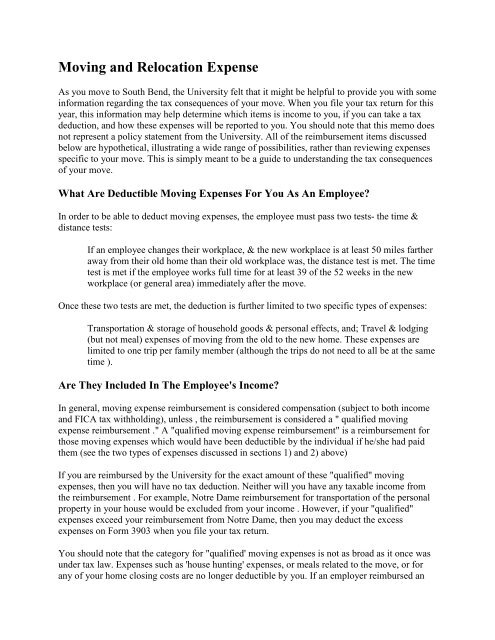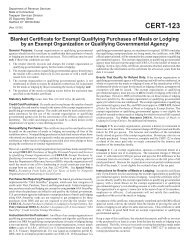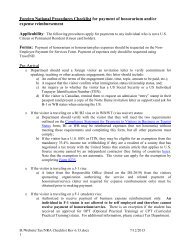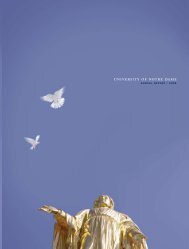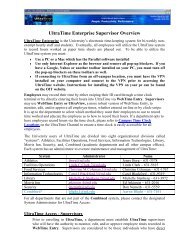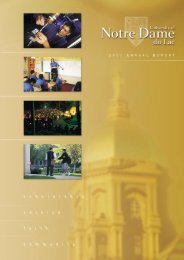Moving and Relocation Expense - University of Notre Dame
Moving and Relocation Expense - University of Notre Dame
Moving and Relocation Expense - University of Notre Dame
You also want an ePaper? Increase the reach of your titles
YUMPU automatically turns print PDFs into web optimized ePapers that Google loves.
<strong>Moving</strong> <strong>and</strong> <strong>Relocation</strong> <strong>Expense</strong><br />
As you move to South Bend, the <strong>University</strong> felt that it might be helpful to provide you with some<br />
information regarding the tax consequences <strong>of</strong> your move. When you file your tax return for this<br />
year, this information may help determine which items is income to you, if you can take a tax<br />
deduction, <strong>and</strong> how these expenses will be reported to you. You should note that this memo does<br />
not represent a policy statement from the <strong>University</strong>. All <strong>of</strong> the reimbursement items discussed<br />
below are hypothetical, illustrating a wide range <strong>of</strong> possibilities, rather than reviewing expenses<br />
specific to your move. This is simply meant to be a guide to underst<strong>and</strong>ing the tax consequences<br />
<strong>of</strong> your move.<br />
What Are Deductible <strong>Moving</strong> <strong>Expense</strong>s For You As An Employee<br />
In order to be able to deduct moving expenses, the employee must pass two tests- the time &<br />
distance tests:<br />
If an employee changes their workplace, & the new workplace is at least 50 miles farther<br />
away from their old home than their old workplace was, the distance test is met. The time<br />
test is met if the employee works full time for at least 39 <strong>of</strong> the 52 weeks in the new<br />
workplace (or general area) immediately after the move.<br />
Once these two tests are met, the deduction is further limited to two specific types <strong>of</strong> expenses:<br />
Transportation & storage <strong>of</strong> household goods & personal effects, <strong>and</strong>; Travel & lodging<br />
(but not meal) expenses <strong>of</strong> moving from the old to the new home. These expenses are<br />
limited to one trip per family member (although the trips do not need to all be at the same<br />
time ).<br />
Are They Included In The Employee's Income<br />
In general, moving expense reimbursement is considered compensation (subject to both income<br />
<strong>and</strong> FICA tax withholding), unless , the reimbursement is considered a " qualified moving<br />
expense reimbursement ." A "qualified moving expense reimbursement" is a reimbursement for<br />
those moving expenses which would have been deductible by the individual if he/she had paid<br />
them (see the two types <strong>of</strong> expenses discussed in sections 1) <strong>and</strong> 2) above)<br />
If you are reimbursed by the <strong>University</strong> for the exact amount <strong>of</strong> these "qualified" moving<br />
expenses, then you will have no tax deduction. Neither will you have any taxable income from<br />
the reimbursement . For example, <strong>Notre</strong> <strong>Dame</strong> reimbursement for transportation <strong>of</strong> the personal<br />
property in your house would be excluded from your income . However, if your "qualified"<br />
expenses exceed your reimbursement from <strong>Notre</strong> <strong>Dame</strong>, then you may deduct the excess<br />
expenses on Form 3903 when you file your tax return.<br />
You should note that the category for "qualified' moving expenses is not as broad as it once was<br />
under tax law. <strong>Expense</strong>s such as 'house hunting' expenses, or meals related to the move, or for<br />
any <strong>of</strong> your home closing costs are no longer deductible by you. If an employer reimbursed an
employee for these 'non-qualified' expenses (<strong>University</strong> <strong>of</strong> <strong>Notre</strong> <strong>Dame</strong> policy does not provide<br />
for payment <strong>of</strong> this type <strong>of</strong> expense), this reimbursement would be taxable to the employee <strong>and</strong><br />
would be subject to payroll withholding taxes.<br />
Are Reimbursements for <strong>Expense</strong>s <strong>of</strong> Other Household Members Considered<br />
Income to the Employee<br />
Typically, any payments made by an employer related to the employee's spouse or children are<br />
considered taxable income to the employee. However, there are exceptions made to this rule in<br />
the case <strong>of</strong> moving expenses. If the expense <strong>of</strong> the spouse or dependent falls into categories 1) or<br />
2) listed above (i.e. transportation <strong>of</strong> household goods, or travel <strong>and</strong> lodging when moving to the<br />
new home) , it is considered a "qualified moving expense reimbursement" <strong>and</strong> would not be<br />
income to the employee.<br />
However, any other move costs that are paid on behalf <strong>of</strong> the employee's spouse or dependents<br />
would be income to the employee(again, subject to all payroll taxes).<br />
Are These <strong>Expense</strong>s Subject to Withholding<br />
As discussed above, if any expense that is reimbursed is not considered a "qualified moving<br />
expense" reimbursement, it would be taxable <strong>and</strong> subject to withholding taxes. For example, if<br />
an employer paid $5,000 in moving expenses to an employee, <strong>and</strong> only $3,500 was for<br />
"qualified" expenses, then $1,500 ($5,000-$3,500) would be taxable compensation included in<br />
the employee's W-2, <strong>and</strong> subject to payroll taxes. This should not be the case as a result <strong>of</strong> your<br />
move to <strong>Notre</strong> <strong>Dame</strong>, since <strong>University</strong> policy typically pays only for "qualified" expenses.<br />
How Are These <strong>Expense</strong> Reimbursements Reported to the Employee<br />
The <strong>University</strong>'s reporting to you will depend on which <strong>of</strong> three categories your moving expense<br />
reimbursement falls into:<br />
1. If the <strong>University</strong> pays your "qualified" moving expenses directly to a third party (e.g.<br />
directly to the moving company), then these expenses will not be reported at all on your<br />
W-2. Remember also that you are not entitled to a deduction for these reimbursed<br />
expenses.<br />
2. If the <strong>University</strong> pays your "qualified" moving expenses directly to you, the employee,<br />
then these expenses will be reported in Box 13 <strong>of</strong> your Form W-2 <strong>and</strong> identified with a<br />
code P (to indicate nontaxable). These expenses are still not taxable to you, but are<br />
reported simply because the reimbursement was made directly to you. Similar to the<br />
expenses in the paragraph above, you are not entitled to a deduction for these reimbursed<br />
expenses unless your actual expenses exceed your reimbursement.<br />
3. <strong>University</strong> policy does not provide for payment <strong>of</strong> non-qualified moving expenses (e.g.<br />
house hunting expenses, or reimbursed meals related to the move, or home closing costs).<br />
Any reimbursement <strong>of</strong> this type would be completely taxable to the employee <strong>and</strong> would<br />
be subject to payroll withholding taxes (whether it was paid directly to the employee or
not). These reimbursed expenses are reported on Form W-2 as additional compensation.<br />
There is no deduction for this type <strong>of</strong> reimbursed expense<br />
Of course, if you're paid for several <strong>of</strong> the different categories above, then the reporting will be<br />
as stated for each category.<br />
We hope this is a helpful guide in determining how to h<strong>and</strong>le moving expenses. If you have<br />
specific questions related to your situation , you should contact your tax preparer.


